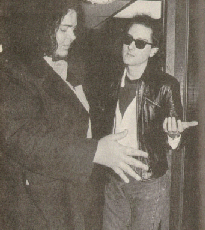Peter Laughner
| Peter Laughner | |
|---|---|

Peter Laughner, right, with David Thomas
|
|
| Background information | |
| Birth name | Peter Ravenscroft Laughner |
| Born |
August 22, 1952 Bay Village, Ohio, United States |
| Died | June 22, 1977 (aged 24) Cleveland, Ohio, United States |
| Genres | Rock, acoustic, proto-punk, garage |
| Occupation(s) | Singer, songwriter, guitarist |
| Instruments | Guitar |
| Years active | 1968–1977 |
| Associated acts | Rocket From the Tombs, Pere Ubu |
Peter Laughner (August 22, 1952 – June 22, 1977) was an American guitarist, songwriter and singer.
A native of Bay Village, Ohio, Laughner remains a rather little known figure; nonetheless, Richie Unterberger described him as "probably the single biggest catalyst in the birth of Cleveland's alternative rock scene in the mid 1970s."
Laughner led a variety of groups. Among them were Mr. Charlie, Cinderella Backstreet, Peter & The Wolves, The Blue Drivers and Friction. However, his most enduring contributions were to Rocket From The Tombs and the early work of Pere Ubu. In addition to all this, he wrote for Creem magazine.
Laughner was a voracious rock fan and writer, and was heavily influenced by the writings of Lester Bangs. Like Bangs, Laughner worshipped Lou Reed, but also drew inspiration from folk and blues figures such as Robert Johnson and Woody Guthrie. Tom Verlaine was also one of Laughner's idols.
Laughner was briefly considered as a replacement for Richard Lloyd when he departed Television, a band he championed from their earliest days. However, Richard Lloyd disputes this.
Laughner had severe drug and alcohol abuse problems that ultimately led to his death by acute pancreatitis in 1977 at the age of 24. Lester Bangs wrote a eulogy for him, simply titled "Peter Laughner is Dead".
Rumors to the effect that Laughner was despondent, even suicidal, at the time of his death have been contradicted by Laughner's last known message, written and mailed to Cleveland singer Ruby Port on the evening prior to his death. This letter revealed his intent to move to a retreat in the Ohio countryside, where he could write new music as well as rest and regain his health.
...
Wikipedia
